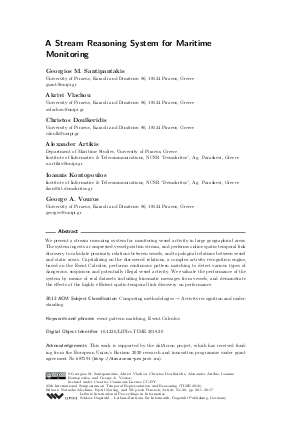A Stream Reasoning System for Maritime Monitoring
Authors Georgios M. Santipantakis, Akrivi Vlachou, Christos Doulkeridis, Alexander Artikis, Ioannis Kontopoulos, George A. Vouros
-
Part of:
Volume:
25th International Symposium on Temporal Representation and Reasoning (TIME 2018)
Part of: Series: Leibniz International Proceedings in Informatics (LIPIcs)
Part of: Conference: International Symposium on Temporal Representation and Reasoning (TIME) - License:
 Creative Commons Attribution 3.0 Unported license
Creative Commons Attribution 3.0 Unported license
- Publication Date: 2018-10-08
File

PDF
LIPIcs.TIME.2018.20.pdf
- Filesize: 0.7 MB
- 17 pages
Document Identifiers
Subject Classification
ACM Subject Classification
- Computing methodologies → Activity recognition and understanding
Keywords
- event pattern matching
- Event Calculus
Metrics
- Access Statistics
-
Total Accesses (updated on a weekly basis)
0Document
0Metadata
Abstract
We present a stream reasoning system for monitoring vessel activity in large geographical areas. The system ingests a compressed vessel position stream, and performs online spatio-temporal link discovery to calculate proximity relations between vessels, and topological relations between vessel and static areas. Capitalizing on the discovered relations, a complex activity recognition engine, based on the Event Calculus, performs continuous pattern matching to detect various types of dangerous, suspicious and potentially illegal vessel activity. We evaluate the performance of the system by means of real datasets including kinematic messages from vessels, and demonstrate the effects of the highly efficient spatio-temporal link discovery on performance.
Cite As Get BibTex
Georgios M. Santipantakis, Akrivi Vlachou, Christos Doulkeridis, Alexander Artikis, Ioannis Kontopoulos, and George A. Vouros. A Stream Reasoning System for Maritime Monitoring. In 25th International Symposium on Temporal Representation and Reasoning (TIME 2018). Leibniz International Proceedings in Informatics (LIPIcs), Volume 120, pp. 20:1-20:17, Schloss Dagstuhl – Leibniz-Zentrum für Informatik (2018)
https://doi.org/10.4230/LIPIcs.TIME.2018.20
BibTex
@InProceedings{santipantakis_et_al:LIPIcs.TIME.2018.20,
author = {Santipantakis, Georgios M. and Vlachou, Akrivi and Doulkeridis, Christos and Artikis, Alexander and Kontopoulos, Ioannis and Vouros, George A.},
title = {{A Stream Reasoning System for Maritime Monitoring}},
booktitle = {25th International Symposium on Temporal Representation and Reasoning (TIME 2018)},
pages = {20:1--20:17},
series = {Leibniz International Proceedings in Informatics (LIPIcs)},
ISBN = {978-3-95977-089-7},
ISSN = {1868-8969},
year = {2018},
volume = {120},
editor = {Alechina, Natasha and N{\o}rv\r{a}g, Kjetil and Penczek, Wojciech},
publisher = {Schloss Dagstuhl -- Leibniz-Zentrum f{\"u}r Informatik},
address = {Dagstuhl, Germany},
URL = {https://drops.dagstuhl.de/entities/document/10.4230/LIPIcs.TIME.2018.20},
URN = {urn:nbn:de:0030-drops-97858},
doi = {10.4230/LIPIcs.TIME.2018.20},
annote = {Keywords: event pattern matching, Event Calculus}
}
Author Details
- Department of Maritime Studies, University of Piraeus, Greece, Institute of Informatics & Telecommunications, NCSR "Demokritos", Ag. Paraskevi, Greece
- Institute of Informatics & Telecommunications, NCSR "Demokritos", Ag. Paraskevi, Greece
References
- E. Alevizos, A. Skarlatidis, A. Artikis, and G. Paliouras. Probabilistic complex event recognition: A survey. ACM Comput. Surv., 50(5):71:1-71:31, 2017. URL: http://dx.doi.org/10.1145/3117809.
-
Alexander Artikis and Marek J. Sergot. Executable specification of open multi-agent systems. Logic Journal of the IGPL, 18(1):31-65, 2010.

-
Alexander Artikis, Marek J. Sergot, and Georgios Paliouras. An event calculus for event recognition. IEEE Trans. Knowl. Data Eng., 27(4):895-908, 2015.

-
H. Beck, M. Dao-Tran, and T. Eiter. LARS: A Logic-Based Framework for Analytic Reasoning over Streams. Technical Report INFSYS RR-1843-17-03, Institute of Information Systems, TU Vienna, 2017.

-
Iliano Cervesato and Angelo Montanari. A calculus of macro-events: Progress report. In Proceedings of TIME, pages 47-58, 2000.

-
L. Chittaro and A. Montanari. Efficient temporal reasoning in the cached event calculus. Computational Intelligence, 12(3):359-382, 1996.

-
G. Cugola and A. Margara. Processing flows of information: From data stream to complex event processing. ACM Computing Surveys, 44(3):15, 2012.

-
Gianpaolo Cugola and Alessandro Margara. TESLA: a formally defined event specification language. In Proceedings of DEBS, pages 50-61, 2010.

-
C. Dousson and P. Le Maigat. Chronicle recognition improvement using temporal focusing and hierarchisation. In Proceedings of IJCAI, pages 324-329, 2007.

-
Bilal Idiri and Aldo Napoli. The automatic identification system of maritime accident risk using rule-based reasoning. In Proceedings of SoSE, pages 125-130, 2012.

-
Robert Isele, Anja Jentzsch, and Christian Bizer. Efficient multidimensional blocking for link discovery without losing recall. In Proceedings of WebDB, 2011.

-
Robert A. Kowalski and Marek J. Sergot. A logic-based calculus of events. New Generation Comput., 4(1):67-95, 1986.

-
R. Miller and M. Shanahan. Some alternative formulations of the event calculus. In Computational Logic: Logic Programming and Beyond, LNAI 2408, pages 452-490. Springer, 2002.

-
M. Montali, F. M. Maggi, F. Chesani, P. Mello, and W. M. P. van der Aalst. Monitoring business constraints with the event calculus. ACM TIST, 5(1):17:1-17:30, 2013.

-
Markus Nentwig, Michael Hartung, Axel-Cyrille Ngonga Ngomo, and Erhard Rahm. A survey of current link discovery frameworks. Semantic Web, 8(3):419-436, 2017.

-
Axel-Cyrille Ngonga Ngomo. ORCHID - reduction-ratio-optimal computation of geo-spatial distances for link discovery. In Proceedings of ISWC, pages 395-410, 2013.

-
Axel-Cyrille Ngonga Ngomo and Sören Auer. LIMES - A time-efficient approach for large-scale link discovery on the web of data. In Proceedings of IJCAI, pages 2312-2317, 2011.

-
A. Paschke. ECA-RuleML: An approach combining ECA rules with temporal interval-based KR event/action logics and transactional update logics. Technical Report 11, Technische Universität München, 2005.

-
Adrian Paschke and Martin Bichler. Knowledge representation concepts for automated SLA management. Decision Support Systems, 46(1), 2008.

-
K. Patroumpas, E. Alevizos, A. Artikis, M. Vodas, N. Pelekis, and Y. Theodoridis. Online event recognition from moving vessel trajectories. GeoInformatica, 21(2):389-427, 2017.

-
T. Przymusinski. On the declarative semantics of stratified deductive databases and logic programs. In Foundations of Deductive Databases and Logic Programming. Morgan, 1987.

-
Mohamed Ahmed Sherif, Kevin Dreßler, Panayiotis Smeros, and Axel-Cyrille Ngonga Ngomo. Radon - rapid discovery of topological relations. In Proceedings of AAAI, pages 175-181, 2017.

